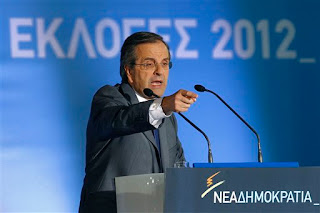China's inflation slows to 1.8% low
Chinese inflation hit
a two-and-a-half-year low in July, official data showed on Thursday, giving the
government further policy leeway to boost weakening growth. The country's
consumer price index (CPI) rose 1.8% year-on-year (y/y) last month, the
National Bureau of Statistics said, the fourth straight month of y/y easing and
the lowest level since January 2010.The slowdown potentially gives authorities
more ammunition to light a fire under the world's second-largest economy, which
grew 7.6% in the second quarter for its worst performance since the height of
the global economic crisis in 2008-2009.Authorities this year have taken
measures including the rare step of slashing interest rates twice in quick
succession while also lowering requirements for how much money banks must keep
in reserve.Chinese leaders, including Premier Wen Jiabao, have expressed
concern over the weakness in the economy and have hinted that the government
may need to take further action to bolster growth.Sun Junwei, China economist
at HSBC in Beijing, said the figure was in line with expectations and confirmed
that inflation overall is trending downward."In general, China's inflation
will likely be moderate and controllable in the future, which offers room for
China to further loosen its (monetary) policy," she said.Sun added that if
other economic data due out later on Thursday comes in worse than expected
there could be a further cut in interest rates or bank reserve requirement
ratios in August.China is scheduled to announce July figures in industrial
production, fixed asset investment and retail sales later Thursday.Helping
suppress the overall consumer price index was a decline of 0.9% in prices for
transportation and telecommunications, according to the data.Inflation for the
first seven months of 2012, meanwhile, was 3.1%, the bureau
said."Inflation continues to peel off rapidly, highlighting an output gap
that the government is trying to plug with rising state investment,"
economists at IHS Global Insight said in a report after the release of the July
data.Producer price inflation (PPI), a leading indicator, declined 2.9% in July
from the same month last year for the fifth straight month of
contraction.Producer prices "continue to highlight the severe deflationary
pressure rippling across the country", IHS Global Insight said, noting
that "deflation, not inflation, is the greatest short-term threat to the
Chinese economy".
Eurozone GDP to fall by 0.3% this year
The eurozone economy
will contract by 0.3% in 2012 before recovering more slowly than expected next
year to expand by 0.6%, a poll conducted by the European Central Bank (ECB)
revealed on Thursday. The data came from the Survey of Professional Forecasters
which the ECB carries out on a quarterly basis. It was published in the
Frankfurt-based bank's monthly bulletin.The previous SPF survey predicted a
0.2% contraction for eurozone gross domestic product (GDP) this year and a 1%
expansion in 2013.Recession-inducing austerity measures in some euro countries
and "higher uncertainty" over the resolution of the single currency's
debt crisis were "the main factors behind the downward revisions,"
the ECB said.Forecasters also said that eurozone unemployment would stay at its
current high of 11.2% throughout 2012 and increase to 11.4% in 2013. Inflation
was projected to fall from 2.3% to 1.7% over the same period.The ECB said it
expected "weak" economic activity both in the second and third
quarter of 2012 and only a "very" gradual recovery afterwards.
"Risks surrounding the economic outlook for the euro area continue to be
on the downside," it noted.The European Union statistical office,
Eurostat, is to publish GDP figures for the second quarter of the year on
Tuesday.
India's shock fall in industrial output
India's industrial
production contracted by a shock 1.8% from a year earlier in June, as
manufacturing output shrank in Asia's third-largest economy, official figures
showed on Thursday, The data underscored the massive job ahead for India's new
pro-market finance minister, P. Chidamabaram, who pledged this week to
"restart the growth engine" of India's sharply slowing
economy.Manufacturing output, which accounts for three-quarters of the index of
industrial production, fell 3.2% from a year earlier in June, according to the
government data.Manufacturing has been undermined by high interest rates to
combat stubbornly high inflation, falling business confidence and Europe's debt
crisis which has hit exports.The 1.8% shrinkage in output by factories, mines
and utilities in June was the third contraction in four months and followed a
revised 2.5% production rise in May.The industrial output reading was far below
analysts' expectations, which were for an increase of 0.80%, according to a Dow
Jones Newswires poll.The weak performance is likely to pile pressure on the
central bank to ease interest rates to spur growth.The bank has said it wants
inflation to come down before cutting borrowing costs, but Chidambaram has
already indicated he wants lower rates, saying "sometimes it is necessary
to take carefully calibrated risks".The weak numbers come as the
left-leaning Congress-led government is under pressure over a string of graft
scandals and its attempts to liberalise the still inward-looking economy to
spur growth have led to gridlock in parliament.India's once-booming economy
grew just 5.3% between January and March, its slowest annual quarterly
expansion in nine years.Capital goods output, an important investment
indicator, slid 27.9% in June from a year earlier.Goldman Sachs economist
Tushar Poddar, who recently pared his full fiscal year growth forecast to 5.7%
in contrast to the central bank's expectation of 6.5% expansion, saw more tough
times ahead."Weak monsoons are also likely to impact rural consumption
demand and exacerbate weakness in investment demand," Poddar said ahead of
the data.Citibank has said if a nationwide drought is declared, which would be
the country's third in a decade, growth could be as low as 4.9% as hundreds of
millions of farmers depend on the annual rains for their income.
